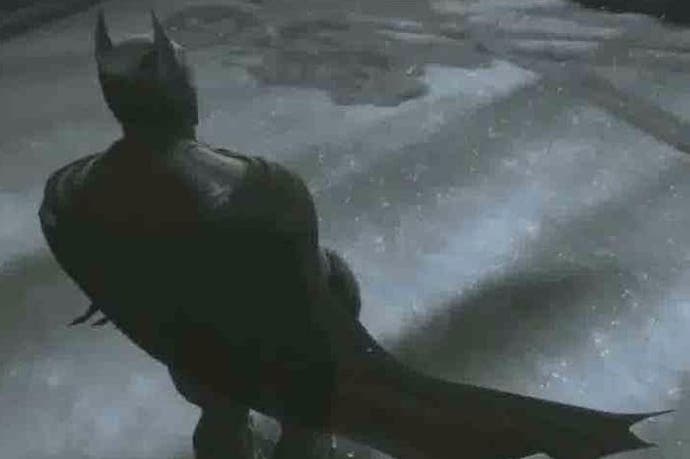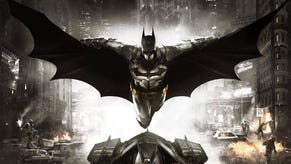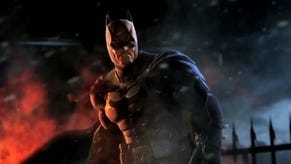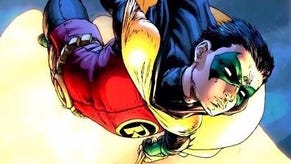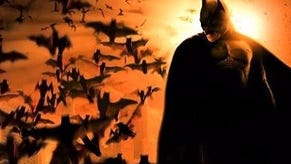Utility belter: in praise of Arkham Origins, the overlooked Batman chapter
The ghost of Christmas past.
Hello! Chris Donlan here. As a couple of Batman's Arkham adventures are getting the remaster treatment this week, we thought it might be interesting to ponder the fate of the one game that didn't make the cut. Oh, BTW, this piece contains some major spoilers for Origins and Arkham Knight.
This is the story of an orphan. Not Bruce Wayne, the crusader shaped by the murder of his parents and forced - like the rest of us - to endlessly relive that traumatic night of scattered pearls and chalk outlines in a benighted alleyway. This is a different sort of orphan, a stepchild being discreetly disowned seemingly to aid its fade from popular memory. It is the increasingly obscured story of Batman Arkham Origins, a game that could plausibly be retitled Mixed Batsignals.
This week's Return To Arkham package remasters the dynamic duo of Arkham Asylum (2009) and Arkham City (2011) for current-gen consoles. Both were critically adored on release, and are viewed as hugely influential titles, vital to securing developer Rocksteady's rock-solid reputation, even if the (outsourced) process of updating them does not appear to have gone particularly smoothly. But what about poor Origins, the stopgap game developed by WB Montreal to help ease the long wait while series architects Rocksteady delivered Arkham Knight? Why not just "do an Uncharted" and go for a triple-bill Arkham remaster?
There is the argument that a game from 2013 is simply too recent a release to justify pouring resources into refreshing textures for PS4 and Xbox One. But in a series characterised by abrupt, emphatic violence, it feels a lot like a takedown. And not even a particularly veiled one, as the hype campaign for 2015's Arkham Knight endlessly referred to that game as the long-awaited completion of Rocksteady's trilogy. That repeated marketing message, like a media version of the classic Arkham cape-sweep-then-percussive-beatdown, helped seed the idea that Origins had somehow not earned its place in the saga.
Is it really the Arkham game that would end up at the bottom of any Batpoll? Poor old Origins does have a reads-like-a-seven critical reputation that was solidifying around it like a glue grenade even on release. Perhaps that's because it relied so heavily on Rocksteady's solidly road-tested formula. Here were your favourite familiar game mechanics being dutifully rehashed by a development studio that, with that blandly corporate WB Montreal branding, even subliminally suggested the sort of TV show that shoots in Canada to save cash. It simply didn't rock the Batboat, unless you counted replacing the key voice talent.
Origins flashes back to a younger Batman barely two years into his crime-fighting career and seemingly stuck in angry loner mode (much of Roger Craig Smith's voice work involves growling "Not now, Alfred!" at the usually imperturbable Martin Jarvis). Nominal baddie Black Mask may be strictly B-list but the framing narrative glitters with an irresistible high-concept lustre: eight of the world's greatest assassins descending on a snowbound Gotham on December 24, each looking to bag the Knight before Christmas to claim Black Mask's $50m bounty. A tantalising set-up, even if it's maybe a little more Stath than Bat.
The game sets about its business with minimum preamble: within minutes, you're infiltrating an overwhelmed Blackgate Prison, refreshing the muscle memory of Arkham's moreish, bone-snapping, mass-brawl ballet. The action soon opens up to Gotham itself, two Arkham City-sized chunks of gothic real estate, linked by the Pioneers Bridge. The sneaky predator gameplay is reintroduced, both inside and out in the snow, as you deploy utility belt gadgets and acrobatic brinksmanship to whittle down the superior numbers of your armed foes.
It is a game fuelled by story, a more headlong version of its predecessor Arkham City: here's another key location to infiltrate, another would-be assassin to neutralise, another crime scene to investigate in elaborate VR-spooling detail. If the sprawl of Gotham seems a little emptier than before - with a snowstorm-enforced civilian curfew - the streamlining of busywork adds to a sense of urgency. That imposing bridge is admittedly a bit of a buzzkill, becoming rather tiresome to grapple across after you've done it a few times. (When jetpack joyrider Firefly threatens to bring it down with a series of bombs in a prolonged mid-game section, the temptation is to let him have his fun.)
Like the game's geography, the campaign is almost exactly bisected, with the Joker revealed as the true mastermind behind Bats' bad night halfway through. A dream-like sequence involves you taking control of the clown prince of crime as he cathartically batters his way through a hostile audience of thugs at a bombing stand-up show. That feels of a piece with the overarching Arkham mythos: surely the Joker is just as associated with that name as Batman, so an Origins story should be flexible enough to include both of them? But some fans regarded it as more evidence of a project operating on cruise control (although rewatching The Dark Knight Rises underlines the value of a functioning autopilot).
Amid the plot machinations, there are moments of real artistry in Origins, sequences and panoramas that transcend its mere gun-for-hire reputation. A predator sequence inside the Penguin's rusted hulk of a hideout breaks the spell of claustrophobia with a crack in the roof that lets the moonlight in. The Gotham Royal hotel has been refitted with both a grotesque interior theme park and a vertiginous suspended lounge. Origins also features the best Batcave in the franchise by far, with a training computer to seamlessly access challenge maps, an industrial wardrobe to house and browse the various collectible Batsuits and appealing moments with Alfred, who - when he's not analysing DNA samples or quarterbacking your infiltration of the GCPD - seems nobly determined that Bruce doesn't miss out on his festive ham.
Even with all of Batman's smoke pellets and sonic batarangs, Christmas is arguably the game's secret weapon. The artful blizzard flurries and incongruously cheery municipal decorations add considerable atmosphere that further elevates the finely-tuned mechanics, and that's even before you start dangling thugs with Santa hats off clock towers in search of intel. There's also a gorgeous Bat-remix of Carol Of The Bells, the instantly recognisable minor-key chimes blending seamlessly with Arkham's ominous soundscapes.
Was the sin of Origins just to be more of the same? Now that Arkham Knight has been and gone - with the paradigm-smashing additions including some cinematic but ultimately unnecessary co-op beat-em-up bits and an inordinate amount of time spent cooped up in a sci-fi tank bristling with incongruous weapons and the slowly dawning realisation that now the Riddler is into building elaborate underground racetracks, I guess? - maybe more of the same doesn't sound quite so bad.
Perhaps it wouldn't be too much of a stretch to draw a comparison between Arkham Origins and Jason Todd, the second Robin who found himself condemned in 1989 after a phone-in vote by DC Comics to decide whether he lived or died. Todd was the literally red-headed stepchild of the Batfamily, an unpopular stand-in who was cruelly dismissed before he even had a chance. Still, it's not like Jason Todd would ever come back to haunt the Arkham franchise, right?
